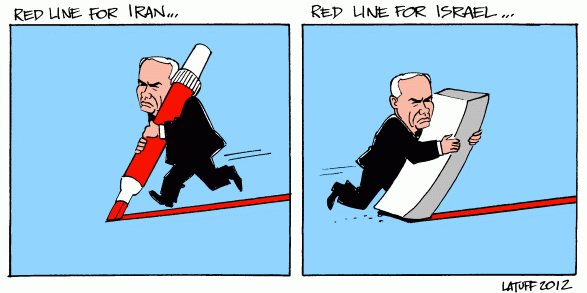
Marc Chagall, one of my favorite painters, had a quirky way of painting people, especially his fellow Jews of Vitbesk, Russia. They were always hovering above their gloomy villages, as if suspended so as to show that they did not really belong there but only made a harsh living out of the poor soil. Think Fiddler on the Roof, blue cows and all.
At least that’s the meaning I always assumed even if I don’t recall being told so by anyone steeped in the subject. However, Israelis no longer need Marc Chagall to symbolize their otherness or to make sense of their rootless narrative: Instead, Marc Chagall’s symbolism should be graciously loaned out to those who better need them in order to make sense of their reality; the Palestinians. Perhaps even better, Danny Dannon, the newly appointed Israeli Ambassador to the United Nations, and a staunch opponent to a Palestinian state and everything peace, should relinquish the Israeli cultural hold on the Chagall floating people imagery as a new model representing his suggestion for a new Palestinian non-territorial reality: “See, it works! We did it for centuries as the Jewish people in exile, you can do it too!”
Netanyahu’s appointment of Danny Dannon to be Israel’s new UN Ambassador is a bit of a joke; at least that’s what I thought when I first saw it announced. It’s not just for the most obvious reasons: that he does not believe in negotiating with the Palestinians, that he believes there should never be an independent Palestinian state, that he thinks Israel should annex most of the West Bank, or that he has argued that Israel should cut off water and electricity to the Gaza Strip. As he himself has pointed out, a majority of current Knesset members may even support him in that position. Rather, what’s more worrying is his complete misunderstanding or perhaps disregard for what the Palestinians have been asking for during the past 50 years: No, it’s not citizenship! (they tried that with Jordan) No, it’s not self-government! (they tried that in the 1980’s) No, it’s not economic and cultural opportunities! (they tried that since Oslo)
In fact, it’s much more simple: it’s territory stupid!
And it’s not just the territory of the built-up areas of Beit-Jala, or Nablus. These are not sky cities that can be connected remotely to the two countries that Dannon suggest should offer Palestinians citizenship. It also happens to be the hills and pastures and the springs and olive groves of their ancestors, the graves of their prophets and saints. They are asking for a homeland, marked by the distance that church bells chime and by the echoes of the muezzin. One where they can plant and sow, build and re-build, and even go hiking. Imagine that: Palestinian hikers! Or perhaps more specifically understood, and currently accepted, it’s the homeland that was left after the 1967 armistice agreement.
While Dannon’s promise of a life without checkpoints in their self-governed Palestinian population centers sounds alluring, having to navigate traffic jams on cocoonish highways between walled-off cities is just not going to cut it, nor is having to plop down from above like Chagall’s subjects, not touching the ground in between, not belonging, but always remaining a visitor. One thing that Danny Danon should know from Jewish history is how deeply territorial a nation can be and how it defines most Middle Easterners existential experience.
Of course, there is a chance that he does know and that his policies and opinions are meant to refute and deny that very possibility. In other words, Dannon represents the personification of the Golda Meir’s question, “Who are the Palestinians,” only with more definite answers this time: annex their unpopulated territory, make them satellite citizens of Egypt and Jordan, cut off Israel’s responsibility for them and hope that they will move. The fact that 70% of Jordanians are already “East Bank Palestinian” (rather than Bedouin) does not make it a homeland for those originating from the former Mandate of Western Palestine. In the Middle East, if you are not a nomad, tribe cannot substitute for territory.
Netanyahu’s appointment of Danny Dannon to the UN, the guardians of the Security Council Resolutions that outline the two-state solution, is therefore both a statement and a rebuke; a statement to the Obama administration that Netanyahu is still not ready to reconcile, and a rebuke to the international community and the UN. But perhaps even more, Dannons appointment—given his outlandish views and his direct personal rivalry with Netanyahu—to a forum where he needs to speak in Netanyahu’s voice, seems beyond reckless. Some have argued that Netanyahu wanted to get rid of Dannon so badly from the country and the cabinet that the UN appointment was the most effective way to accomplish that goal.
But there is also evidence that Netanyahu may in fact be taking another stab at the Obama administration with this move. Dannon’s closest US friends are clearly on the GOP side of the aisle, and he is so well connected to the conservative donor community that he had to pay a fine in the last Israeli elections (2013) because he received too much money from abroad. According to this article, 22 donations came from the state of Arkansas alone! When evangelicals and conservatives, such as Glen Beck, Mike Huckabee, or Sarah Pailin visit Israel, Dannon is apparently their favorite tour guide. As Johns Stewart said about Huckabee’s most recent trip to Israel: “He won’t be meeting any Palestinians on this trip. That’s good because then they might convince him that they actually exist.”



















